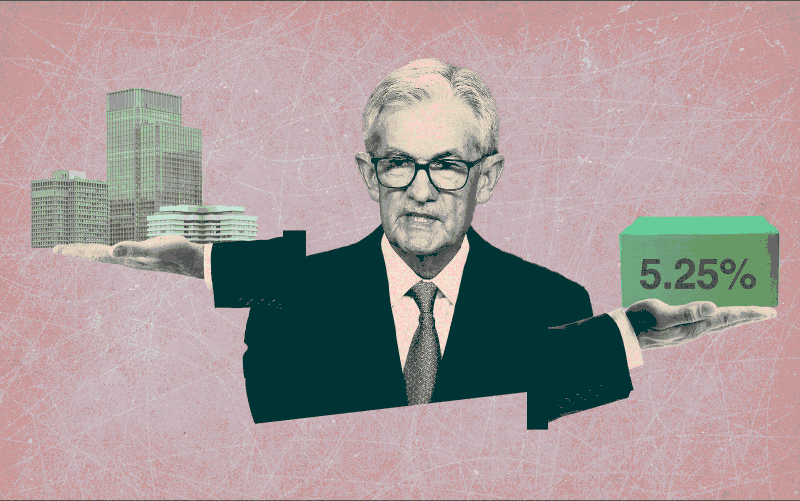Last month, the Federal Reserve got the kind of data it’s been looking for.
Inflation cooled and unemployment rose — a sign the jobs market may be normalizing.
Markets believe the indicators will persuade the central bank to finally cut interest rates.
The dominant question in commercial real estate, however, is whether rates will fall far and fast enough to let struggling borrowers refinance.
The short answer is, it depends. The London Stock Exchange Group spit out three different scenarios for where the Federal Funds rate — currently at 5.25 percent — ultimately lands.
“The contrast between the three scenarios is stark,” write report authors Robin Marshall and Luke Lu, who used Yield Book data on fixed-rate CMBS loans for their analysis.
What is clear, they said, is the Fed’s trajectory could make or break about half of the CMBS loans coming due over the next two years — a total of $89 billion.
The best-case scenario for borrowers and the economy is what LSEG calls a “more normal rate-cutting cycle.” It’s similar to bank ING’s best-case, which the firm considers to be 50 percent probable, and what is already priced into the market: 100 basis points of cuts by year end.
In the “normal” scenario, the Fed cuts rates by 50 basis points each quarter — 25 basis points per meeting. In the second quarter of 2025 rates would fall to 3.75 percent, and 1.75 percent a year later.
That’s a rosy outcome for CMBS borrowers.
Sponsors who refinanced last month borrowed at rates around 7 percent, compared to 4 percent or so 10 years ago, according to LSEG. At the higher rate, many properties can’t meet the debt service coverage ratio — revenue compared with mortgage payments — required to refinance. That’s why the “fail rate” for refinancings is 47 percent.
But if rates drop 325 basis points in the next two years (the “normal” scenario), the fail rate for refinancings falls to 13 percent, according to LSEG.
Worst-case scenario
The worst outcome for borrowers would be if the Fed holds to its “higher-for-longer” strategy.
In that reality, inflation stays sticky, employment high, the economy strong, keeping Fed Chair Jay Powell conservative with cuts. Rates are pared to 4.5 percent in mid-2025 and 3.5 percent by mid-2026, LSEG projects.
If “higher-for-longer” plays out, only $3 billion in maturing loans are bailed out by rate cuts and another $7.3 billion by extensions. That leaves nearly $31 billion in maturing debt to die on the vine. The fail rate clocks in at 35 percent.
The third scenario is a double-edged sword.
Should the economy weather some sort of shock, LSEG predicts that cuts as high as 100 basis points per quarter — 50 basis points at each Fed meeting — “would be quite plausible.” In that instance, the Fed funds rate drops to 0.25 percent by the second quarter of 2026.
For commercial real estate borrowers, such a steep reduction would be a lifesaver. Only 5 percent of sponsors would be unable to refinance, LSEG projects.
But it would come with bad news, too. Such aggressive cuts would only happen if the Fed were reacting to a recession that sapped demand across asset classes, pressuring owners’ net operating income.
The bottom line: The next three months are pivotal for commercial real estate borrowers with maturing loans.
The Fed’s next steps are still a big unknown. It’s possible Powell will give more insight this week at the Kansas City Fed’s annual conference in Jackson Hole, Wyoming. At least, economists are hoping for that.
For now, ING’s report headline says it best: “More twists and turns to come.”
Read more



